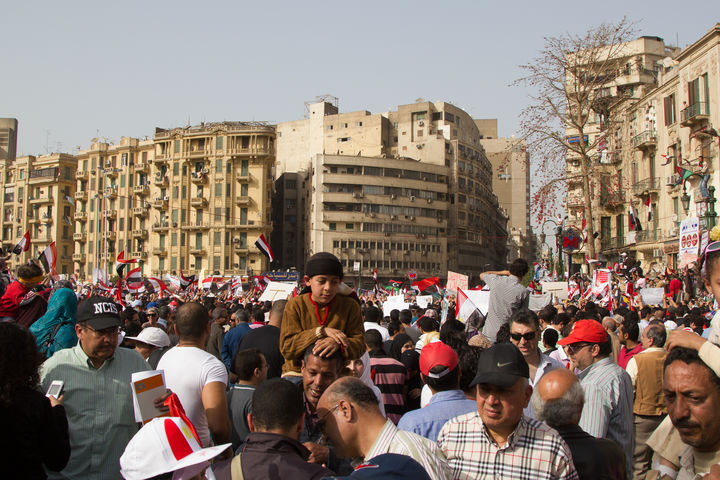Tahrir Square
Cairo, Egypt
The oldest trick in the hotel tout’s book is to tell you that the hotel you’re going to is closed/burned out/infested by zombies, but they happen to know of a better one just nearby. As I wander around Midan Abdel Menem Riad, trying to relate the gray lines on the map to the tangle of roads and flyovers on the ground, I catch sight of a large building that appears to have been completely gutted by fire. The thought strikes me that it would make an excellent prop for any tout trying the “your hotel burned down”
ploy. A moment later it dawns on me that what I am looking at is the remains of the National Party HQ.
Fortunately, the hostel I’ve picked is quite intact and free of zombies. The helpful woman at the desk explains the local geography and lists the key landmarks in the neighborhood. “The museum is here … But there is another demonstration in Tahrir Square. They hope for a million people. This may not be the best day to go to Tahrir Square,”
she says with masterly understatement.
Having passed up my chance at a front-row seat for the Libyan Revolution and the Syrian, and having arrived too late for the Egyptian, it seems to me that the least I can do is to go along for the after-party. I dump my bags and head for Tahrir Square.
I arrive just in time to see a small fierce-looking group marching down from the 6th of October Bridge. From the fact that they are waving green flags as well as red, white and black, I assume that they must represent some particularly Muslim faction. A cluster of cameramen converge on them, thrusting videocameras in their faces to capture their warlike expressions and, perhaps, opting for the close-up to avoid showing that it’s actually a very small march. Five minutes later, I see the same group, ambling slowly back towards the bridge, flags trailing. Their moment of televisual stardom assured, they are heading peacefully home.
In the square itself the atmosphere is something between a rock festival and a school science fair. Everyone wants to show off their placards, most of which feature caricatures of Hosni Mubarak executed with varying degrees of ability and vitriol. In a number, the former president’s head has been imposed on the body of various animals; in others, he is depicted as a pharaoh; in many, he is shown behind bars, or surrounded by dollar signs. That at least is easy enough to understand.
There’s no obvious overall organizing principle. Anyone who can muster up a microphone and a few friends seems to have set up their own little speaker’s corner. Anyone who stands up and starts shouting is immediately bracketed by a videocamera, three point-and-shoots, and about a dozen cameraphones. Ignorant of Arabic as I am, it’s a little hard to tell what’s going on. They may be calling for prompt punishment for Mubarak, or for the overthrow of the state of Israel, or for recognizing the potato as the national fruit of Egypt. There may not be a million people in the square, but I’m willing to bet that there are enough for all three of those viewpoints to be represented, and probably five or six more as well. The speakers shout and stab their fingers in the air, and everyone smiles and is happy. It’s the most relaxed demonstration I’ve ever attended.
I circle the square, photographing the better placards. Most people are happy to have their work photographed; some are actually insistent. A bearded man in a gallibiya, his forehead marked by the permanent bruise that marks the especially devout, scowls fiercely as I take his picture, then gives me a huge smile when I smile and nod my thanks.
“Do you understand what’s going on?”
a blonde woman asks me. I sheepishly admit that I don’t entirely. “Well, over there,”
she says, “They are trying Mubarak in the popular court.”
The trial is apparently still going on, so she doesn’t know what the verdict is, but I guess that it’s unlikely to go in the former dictator’s favor.
A group that I assume to be a Muslim youth club has taken over the last surviving patch of untrampled green grass and installed a DJ. He seems to have a limited selection of music, because he keeps coming back to a pop song whose catchy refrain of “Allahu akbar, bishmillah, Allahu akbar, bishmillah”
drills itself into my brain and stays there for hours.
When my feet start to feel tired, I leave the square and head down towards the Nile. Behind the National Party HQ, the parking area is filled with burnt-out vehicles. As I peer through the bars of the gate at the vehicular holocaust, a posse of very young soldiers in tan camouflage emerge from a security post. “Welcome to Egypt, welcome to Egypt,”
they call happily, smiling and waving at me from the midst of the devastation.
